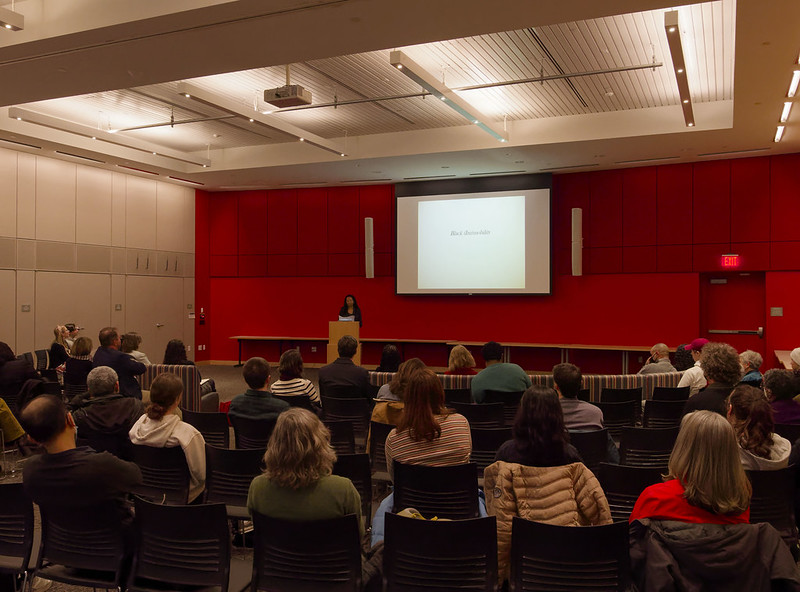On Wednesday, Feb. 22, the Commonwealth Honors College hosted “Slavery, Mobility, and the Creolized Counter-Knowledge of Resistance,” featuring keynote speaker Charmaine A. Nelson.
Nelson, a provost professor of art history in the Department of History of Art and Architecture at the University of Massachusetts, spoke about the transatlantic slave trade that existed in both the U.S. and Canada, and the immobilization of slaves by their enslavers. Nelson highlighted aspects of slavery and Black history that are both widely misunderstood and underrepresented.
The transatlantic slave trade was an oceanic trade of African men, women and children that began in the mid-sixteenth century and lasted until the 1860s, according to the website, “Slavery and Remembrance.” European traders loaded captives at various points across the African coast.
She began her lecture speaking about the loss of African culture and the forced assimilation that occurred through various forms of control by their enslavers. Nelson explained that later generations of slaves born in the Americas, known as Creoles, had a greater lack of understanding of their African culture due to enslaver regulations.
“Within transatlantic slavery, enslavers imposed various strategies of control upon the enslaved, employing terror, physical abuse, psychological coercion, controlling access to food, healthcare, material objects, and implementing prohibitions of what they saw as ‘dangerous African cultural practices’ and ‘knowledge acquisition,’” she explained.
She connected this statement to the intellectual transformation of Creole people, as they were able to use European literacy by means of escape. Nelson explained that the enslaved were blocked from the access to knowledge, and consequentially their potential.
Nelson expressed that that despite white people’s underestimation of Black intellect, “some Black people came to master European languages both through speech and reading and writing … so arguably, slavery was indelibly linked to intellectual transformation since, for enslaved Blacks, literacy was an essential component of assistance through flight.”
Nelson then introduces one of her main points: transatlantic slavery through the Americas. She explains that there is a common misconception that Canada was not as involved in slavery and that many Canadians have the assumption that it solely occurred in the United States, leaving Canada free of blame.
“Little is known about Canadian slavery both inside and outside of the nation. However, the small scale of the field of the Canadian slavery studies is not a byproduct of an archival deficit, but rather a deep-seeded hypocrisy and national amnesia,” Nelson said.
Nelson explained that in the United States, there is a general knowledge of slavery that is lacking in Canada, even though in both regions, slavery was present for over two centuries.
Today in Canada, there is a celebration of the 31 years that freed slaves traveled from the U.S. to Canada during the time that slavery was banned in Canada, but not in the U.S. However, Nelson explained that there is a general lack of responsibility that Canada takes for the systemic oppression and racism freed slaves faced once they arrived.
As Nelson explained, slave trade and slave immobility were present within transatlantic trade. She used examples of two different slave biographies to show the limitations Black people had in cities such as Quebec City and Montreal.
Alex Trey, a graduate student studying art history, appreciated that Nelson spoke on topics that aren’t well known in history so that people can properly understand their past and their countries’ history.
“I think it’s important in that regard for people to have knowledge about these lesser-known aspects of history,” Trey said, “We’re looking at Canada being involved in something most Canadians might not know Canada was involved in, and I think there’s a lot of things like that for all countries … people might not know how deeply involved they were.”
Freshman public health sciences major Leo Scaramozza agreed, emphasizing the contribution of new topics to listeners, and why it is important for learners to branch out from the confines of what is already known.
“I think it’s important to hear different ideas, there’s always something out there, there are things today that I learned about that I’ve never heard about before,” he said. “And having different specialists from different fields that maybe you don’t think about in your daily life … is really important.”
Nelson ended her speech by emphasizing slave perseverance and intelligence, explaining that despite the efforts installed by white enslavers, Black people were able to overcome and push past the limitations set for them.
“In spite of the apparent evidence of the devastating abuse of enslavement of Black people by white enslavers and employers in Canada through the strategic control of mobility… undoubtedly there is also indisputable evidence of free, Black and enslaved people building networks, calling upon allies and using their intelligence, skills, talent, ingenuity and perseverance to outmaneuver their oppressors,” Nelson said.
Eve Neumann can be reached at [email protected].




















